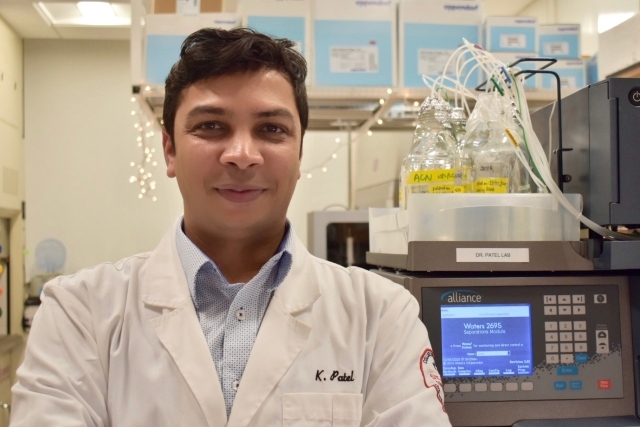
Lung cancer is a leading cause of cancer deaths worldwide, and Ketan D. Patel, Ph.D., Assistant Professor, Department of Pharmaceutical Sciences, recently received a substantial National Institutes of Health (NIH) grant to study its progression and resistance to certain therapies.
The grant, “Synergistic Combination of Proteolysis Targeting Chimera with a Translational Formulation for the Treatment of Intractable Lung Carcinoma,” is for $492,000, and was provided by the National Cancer Institute of the NIH. The grant is funded under the NIH’s Research Enhancement Award Program R15.
“Development of drugs resistant to existing therapy pose a big challenge to clinical success,” Dr. Patel explained. “The project is aimed to simultaneously target three key oncogenic drives of lung cancer progression and resistance. We have identified a very lethal combination of next-generation molecules known as Proteolysis-targeting chimera (PROTAC) for the treatment of lung cancer with diverse genetic mutations.”
Dr. Patel said that the focus of his work is “bench-to-bedside research” for the study of intractable diseases. “My laboratory is working on developing promising therapeutics for the treatment of drug-resistant cancer using the novel class of anticancer molecules (e.g., protein degraders and PROTAC) and tumor-specific nanotechnology.”
Arriving at St. John’s in 2016, Dr. Patel enjoys the University’s supportive and collaborative environment. “I have a passion for research, teaching, and mentoring young minds,” he stressed.
Joining the faculty of St. John’s, Dr. Patel recalled, “was like a passion turning into a profession.” He has nothing but praise for the College of Pharmacy and Health Sciences faculty, administration, and staff. “We have an exceptional undergraduate program, as well as a renowned graduate research program.”
He added, “We support our students’ research and our faculty possess a diverse complementary expertise for drug discovery and clinical development. In the last few years, I have received multiple grants from the NIH, foundations, and the corporate world for research on drug-resistant melanoma and pancreatic cancers, which can only enhance our reputation.”
Dr. Patel noted that his lab also focuses on advanced formulation strategies for opioid abuse deterrents, gene delivery, 3D printing, and HIV prevention.
“Funding is a very vital element of academic research,” he explained. “It allows us to purchase cancer cells for maintenance, testing, and animal study, as well as the chemicals, biological agents, equipment, and other resources required to do our work. Research-grade material is expensive. Substantial funding from organizations like the NIH help us explore novel ideas for the treatment of various diseases and training undergraduate and graduate students in biomedical research.”
Related News
Prepared to Care: How Anya Jiminez Found Her Calling in St. John’s Nursing Program
In 2024, St. John’s University ushered in a brand-new era for health sciences education when the state-of-the-art St. Vincent Health Sciences Center opened, housing the Department of Nursing and other...
Student Turns Caregiving Experience into a Nursing Career
From an early age, Emma DerGarabedian seemed destined for a career in health care. “As a young athlete, I was overly injured and overly fascinated by injuries,” the St. John’s University senior said...
Celebrating Care and Kindness: DAISY Awards Honor St. John’s Nursing Excellence
Three members of St. John’s University’s Department of Nursing community in the College of Pharmacy and Health Sciences were honored in 2025 with DAISY Awards, a recognition program established by The DAISY Foundation that celebrates, recognizes, and thanks nurses for the care and kindness they provide.
